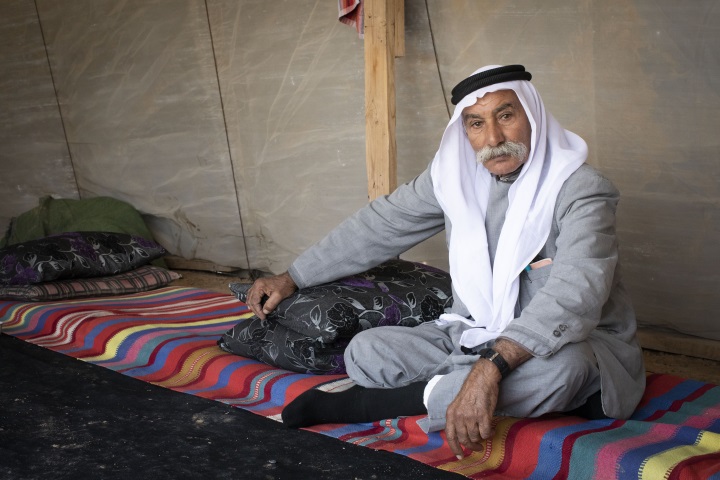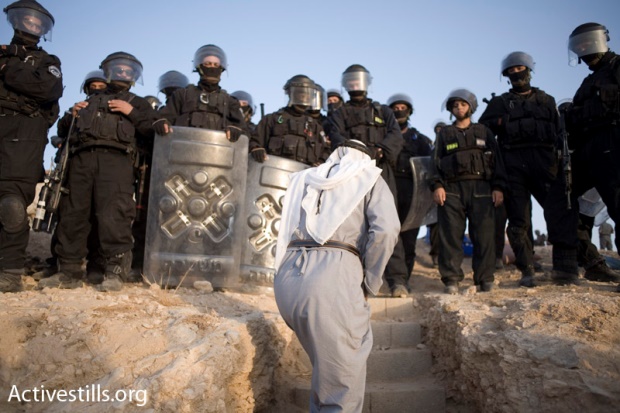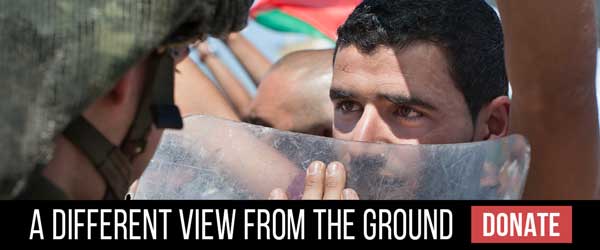Israeli authorities have demolished Al-Araqib over 100 times. Before heading to prison for rebuilding and staying on his land, the village’s leader says he knows justice is on his side.

“I have a good feeling I’ll be in prison alongside Netanyahu,” Sheikh Sayeh Abu Madi’am jokes, sitting in a tent in the unrecognized Bedouin village of Al-Araqib, which Israeli authorities have demolished well over 100 times — 136 times, to be exact.
Later this month, Abu Madi’am is supposed to begin serving a 10-month prison sentence for unlawfully entering and trespassing on public land — his village’s land. A court case to resolve whether he owns the land, which his lawyers say should have been concluded before he could be convicted of trespassing on it, is still pending.
“I did not steal, I did not cheat,” Abu Madi’am says. “The law recognizes property purchased by Jews before 1948 but it does not recognize a Bedouin who bought land from another Bedouin in 1905. Our cemetery has been here since 1914. Where was the Israeli government back then?”
Al-Araqib, located just a few miles from Be’er Sheva in the south, has become a symbol of the Palestinian struggle against Israeli efforts to disposes the Bedouin community of their land and homes in the Negev, or al-Naqab in Arabic.
Al-Araqib’s land was expropriated under a 1953 law that allowed the state to easily take land for purposes of “development, settlement, and security.” Israeli authorities have never used the land, however, for any purpose.
In the 1970s, Israel allowed Bedouins to file land ownership claims. At least on paper, it offered them a fair process for adjudicating such claims. In the early 2000s, however, the state froze that process and began filing counter claims on plots of land claimed by Bedouin citizens of Israel, seeking to register the plots as state land. That’s what happened when Al-Araqib filed an ownership claim.
The state has a 100-percent success rate in all of the counter claims it has filed.
I first met the sheikh in 2009 at the village’s first protest demanding that Israel connect their homes to water, electricity, and sewage grids. Israel refuses to connect dozens of Bedouin villages in the Negev — referred to as unrecognized villages — to basic infrastructure.
At that time hundreds of people lived in Al-Araqib, in small cement homes. They had constructed their own roads, a water tower, and used generators for electricity. Almost a decade later, but especially since the first demolition took place in July 2010, everything is different.
Many of Abu Madi’am’s family members have long since fled to the nearby township of Rahat, driven out by difficult living conditions in the village, which Israeli authorities have demolished more than once a month on average. After every demolition, those who remain reconstruct their tents. From the authorities’ perspective, every time the villagers “rebuild,” they are violating the law.
Only a few dozen people remain today. Some of them are living inside the village cemetery because it’s the one place authorities won’t carry out demolitions.

The sheikh believes his arrest was part of an attempt to drive the Negev’s Bedouin population off its land.
“They sprayed our crops [with pesticides] for years and did not succeed. They demolished our buildings and did not succeed,” says Abu Madi’am. “They destroyed our future and the future of our children and did not succeed. They are left with only one option: to do away with the people of Al-Araqib and send them to prison. If they think sending me to prison will act as a deterrent, they’re making a big mistake.”
Despite the violence and daily harassment, Abu Madi’am remains optimistic: “I believe justice is on my side.”
“The government is re-opening wounds from 1948. Instead of putting a Band-Aid on it so it can heal, they’re pouring salt on it,” says Abu Madi’am. “Those who remained in what became Israel after the expulsion of 1948 are now being expelled again. This time they are using a different method.”
Israel’s primary tactic, used in other villages and in East Jerusalem, is to express willingness to recognize Bedouin ownership claims to their land and even compensate them for it — but only if they agree to give it up.
Abu Madi’am has refused all such offers.
I press the sheikh, asking him whether there’s room for compromise, perhaps where he only has to give up some of his land. “The authorities have tricked many Bedouins in the Negev,” he responds, claiming that alternative plots of land have not panned out to be what was promised. But then he says that if authorities came to him with a serious offer, one that included one-for-one compensation for the same size plot of land, then there might be a path to some sort of agreement.
“They turned us into regulars at the Be’er Sheva court. I’m there almost every week,” he says, chuckling, of the numerous cases pending against him. In addition to the criminal cases — there are several — the state is demanding he and others pay compensation to cover the costs of all the times authorities had to demolish their homes. There is also a contempt of court case for staying on their land despite court orders to leave. And then there is the case he and the other villagers filed against the state, demanding that it recognize their ownership of the land.
The sheikh says he’s not afraid of going to prison for the crime of staying in his home: “I want to prove to the world and to the State of Israel that its laws do not [equally] protect Arabs in Israel.”
“I hope that all those Jewish Israelis striving for coexistence do not forget about Al-Araqib and continue supporting us,” he concludes. “It doesn’t matter if I’m in prison or if I die and am buried in the village’s cemetery, I will feel your support.”
A version of this article was first published in Hebrew on Local Call. Read it here.


